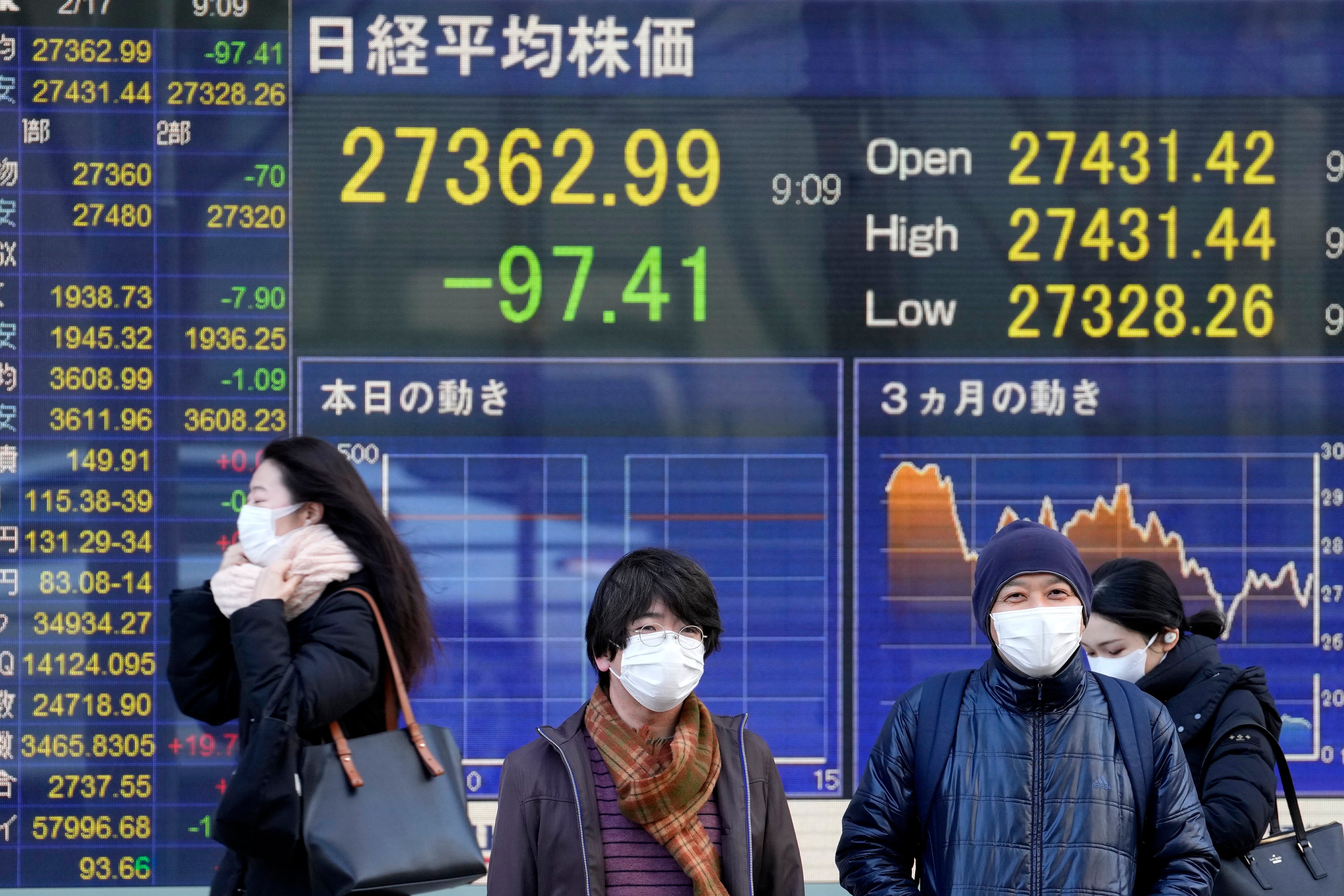Asian stocks mixed after Fed gives no details of rate hikes
Asian stock markets are mixed after Federal Reserve policymakers indicated they are leaning toward more decisive action on inflation but set no firm targets

Your support helps us to tell the story
From reproductive rights to climate change to Big Tech, The Independent is on the ground when the story is developing. Whether it's investigating the financials of Elon Musk's pro-Trump PAC or producing our latest documentary, 'The A Word', which shines a light on the American women fighting for reproductive rights, we know how important it is to parse out the facts from the messaging.
At such a critical moment in US history, we need reporters on the ground. Your donation allows us to keep sending journalists to speak to both sides of the story.
The Independent is trusted by Americans across the entire political spectrum. And unlike many other quality news outlets, we choose not to lock Americans out of our reporting and analysis with paywalls. We believe quality journalism should be available to everyone, paid for by those who can afford it.
Your support makes all the difference.Asian stock markets were mixed Thursday after Federal Reserve policymakers indicated they are leaning toward more decisive action on inflation but set no firm targets.
Shanghai and Seoul advanced while Hong Kong declined. Tokyo retreated after Japan's January exports grew less than expected. Oil prices, which are volatile due to anxiety over a potential Russian invasion of Ukraine, fell by more than $1 per barrel.
Wall Street's benchmark S&P 500 index rose while the Dow Jones Industrial Average declined Wednesday after notes from the latest Fed meeting showed officials suggested a faster pace of interest rate hikes “would likely be warranted.”
The minutes “showed a lack of clear commitments on the size of rate hikes and balance sheet reduction,” said Yeap Jun Rong of IG in a report. That suggests the Fed's attitude might be “less hawkish than previously thought.”
The Shanghai Composite Index rose 0.2% to 3,472.16 to 3,474.98 while the Hang Seng in Hong Kong shed 0.4% to 24,618.20.
The Nikkei 225 in Tokyo gave up 1% to 27,190.83 after January exports rose by 9.6% over a year earlier, well below expectations.
The Kospi in Seoul advanced 1% to 2,755.56 after the government reported the economy added 1.1 million jobs in January and the unemployment rate edged lower.
Sydney's S&P-ASX 200 was less than 0.1% higher at 7,323.80 while India's Sensex opened down 0.1% at 57,924.85. New Zealand and Singapore rose while Jakarta retreated.
On Wall Street, the S&P 500 rose to 4,475.01. The Dow Jones Industrial Average gained slipped 0.2% to 34,934.27 the Nasdaq composite fell 0.1% to 14,124.09.
Investors are trying to figure out how stock prices will react as the Fed withdraws economic stimulus to cool inflation that is at a four-decade high.
According to the Fed's notes, officials agreed at their January meeting that faster rate hikes would be needed “if inflation does not move down” as the central bank's policymaking committee expects.
As recently as December, Fed officials forecast inflation, which stands at 5.8%, would fall to 2.6%.
Most analysts expect Fed officials to raise that forecast at their next meeting in March.
On Monday, James Bullard, president of the Federal Reserve Bank of St. Louis, repeated his call for the Fed to take the aggressive step of raising its benchmark short-term rate by a full percentage point by July 1. Esther George, president of the Kansas City Fed, expressed support for a more gradual approach. Mary Daly of the San Francisco Fed declined to commit herself to more than a modest hike next month.
Rising prices have prompted concern consumers might pull back on spending.
Despite that, the government reported Wednesday that January retail sales surged 3.8%. That compares with a decline of 2.5% the month before.
Investors also are watching the potential for a possible Russian invasion of Ukraine.
Markets rallied Tuesday after Moscow said it removed some troops near the Ukraine border, but Western officials expressed doubt about that.
Energy markets have been volatile because Russia is one of the biggest oil producers. Any military action that disrupts supplies would jolt prices and global industry.
In energy markets, benchmark U.S. crude fell $1.16 to $92.50 per barrel in electronic trading on the New York Mercantile Exchange. The contract rose $1.59 to $93.66 on Wednesday. Brent crude, used as the price basis for international oils, sank $1.03 to $93.78 per barrel in London. It rose $1.53 the previous session to $94.81.
The dollar declined to 115.27 yen from Wednesday's 115.41 yen. The euro declined to $1.1358 from $1.1391.